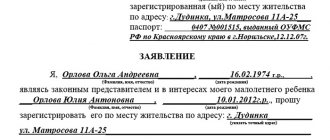Issues of relationships between children and parents are regulated by the Family Code of the Russian Federation and other legal acts. Often, controversial situations arise in the family, which may affect the continued residence of children with their parents. Most often this happens when spouses divorce.
Who the child ends up with after the divorce depends on the individual circumstances of the case. In some situations, it is advisable to determine the place of residence of the children with their mother, in others it is better to entrust the upbringing to the grandfather. The court will consider the issue and take into account not only the wishes and capabilities of adults, but also the interests of the child.
Parents' rights to children after divorce
Neither parent has a priority right to live together with the children. In the event of divorce, the father and mother retain existing rights and obligations and are equally responsible. In other words, legally the relationship between parent and child does not change. If one of the parents with whom a minor lives prevents communication with the other, then this is a violation of his rights.
After the divorce, the father and mother will still be the official representatives of the minor.
Parents are authorized by law to take the following actions in relation to their child:
- choice of last name, first name and patronymic;
- communication and facilitating communication with relatives;
- participation in everyday life, regardless of who the child lives with;
- choice of place of education and form of training;
- definition of leisure - additional electives, clubs, sections;
- joining religion, etc.
The main criterion for the exercise of parental rights is the priority of the interests of the child. For the judiciary and the law, mother and father are completely equal. This means that the decisive factor in determining the child’s place of residence will be existing circumstances, the desire of the minor and the opinion of the guardianship and trusteeship authorities.
After the parents divorce, the child retains the following rights:
- for housing;
- for communication;
- on personal property;
- for material maintenance;
- to your own opinion.
These rights cannot be lost as a result of parental divorce or for any other reason.
Statement of claim to determine the child’s place of residence
When deciding to file a claim in court to determine the child’s place of residence, it is important to be guided by the principle of creating the most favorable conditions for the child. Often such claims are driven by the personal wishes of the parent living separately, but such a position will most likely not find understanding with the court.
In order to correctly prepare such a claim, careful preparation and submission to the court of a number of mandatory documents is required, confirming that the residence of this particular parent will allow the child to feel as comfortable as possible and will ensure the protection of his rights and the freedom to exercise them. As a general rule, it is considered that parents are able to independently agree on the child’s place of residence.
This is interesting: Residence permit in Spain for Russians
A parent living separately has the right to establish the procedure for participation in the upbringing of the child, by agreement or through the court (see - statement of claim for participation in the upbringing of the child), the second parent, in case of violation of this order, can also contact the police, guardianship and trusteeship authorities for return him a child. The issue of a child living with one of the parents, if an agreement cannot be reached, will be decided by the court.
Statement of claim to determine the child’s place of residence
Who will the children stay with after the divorce?
Family disagreements related to issues of living with a child and communicating with him are considered exclusively in court. In this case, the court will be guided by the provisions of Art. 24 IC RF. In accordance with this legal act, the equality of father and mother in the process of raising a child is determined.
Despite the fact that parents are equal before the law when determining the place of residence of a minor, according to statistics, the vast majority of court cases of this kind end with the child remaining with the mother (in 90% of cases). The remaining 10% of cases imply that the minor remains with his father or will live with both parents alternately.
When making a decision, the court is based on who the child is more attached to, and also relies on the educational experience of each parent. For example, due to his busy work, the father is rarely at home, and, therefore, cannot provide the child with the necessary care and attention.
A weighty, and often it can be said, that the only argument for the court in deciding to leave a child with a man is the immoral behavior of the mother. If she leads an indecent lifestyle, suffers from alcoholism or drug addiction, then the court will leave the child with the father or give it to the guardianship of a close relative (for example, a grandmother).
Children under three years of age always stay with their mother. This rule is established by the International Declaration of the Rights of the Child. There are exceptions to this rule, namely:
- mother-child abuse;
- immoral lifestyle;
- mental disorder;
- the presence of a serious illness that prevents proper care of the minor.
If the child is over three years old, the court will also consider other circumstances.
Determining the order of communication and place of residence
The current legislative norms define two options for communicating with children if they live with another parent:
Pre-trial
When using this method of determining the order of communication, the guardianship and trusteeship authorities are involved. To do this, you must contact the territorial department of the institution at the child’s place of residence and submit an application in the prescribed form. The form will be provided by a department employee.
The method has a number of advantages. First of all, this is an opportunity to resolve the issue peacefully. In addition, the participation of guardianship and trusteeship authorities does not incur any costs, which cannot be said about going to court.
Judicial
Involves filing a claim at the place of residence of the defendant and the minor child. Cases of this category are considered by district and city courts of general jurisdiction. It is recommended to engage a competent lawyer for legal proceedings.
If the spouses were unable to reach a compromise and resolve the issue of the residence of their children peacefully, they will have to go to court. A representative of the guardianship and trusteeship authority is required to attend such processes. This is provided for in Art. 78 RF IC.
Determining your place of residence is a serious matter. The court considers many factors before making a decision. One of them is the conditions of the place where children live. A special commission is sent to identify the characteristics of the living space. As a result of the inspection of the property, a living conditions inspection report is drawn up.
This is not the only factor that can influence the decision of the judicial authority. Also important:
- Living conditions. The amenities and living conditions are taken into account.
- Social position in society. Parent’s employment, income level, criminal record, various legal precedents, health status.
- Age. Children over 10 years of age have the right to directly participate in court hearings. Their opinion is often decisive when determining where to live.
- Opportunity for full education and development. The proximity of the house to a kindergarten, school, children's art center, etc. will be assessed.
- Relationship between father and mother. A parent who requires regular communication with the child should not focus his attention on the conflict with the other parent. If this fact is revealed, the number of meetings with the child will be limited.
The judgment will be based on a complex of factors. It is always objective and does not contradict the rights and legitimate interests of the minor.
Example of a claim to determine a child’s place of residence
In the _________ district court of the city __________ ____________________________
Plaintiff: ____________________________ Address: ____________________________
Defendant: ____________________________ Address: ____________________________
Third party: Guardianship and trusteeship authorities of the district “________” of the city ________ Address: ____________________________
STATEMENT OF CLAIM to determine the place of residence of a minor child
I am the Plaintiff, _______________________, I am the father of a minor ________________________, born _________, which is confirmed by the birth certificate series II-MU number ________, issued by the __________ department of the Civil Registry Office of the Civil Registry Office of the city _______ ________. The mother of _________ is the defendant, ____________, with whom I was in a marriage that was dissolved on _________.
This is interesting: How to calculate vacation pay in 2021 example
After the termination of marital relations between me and the defendant, our common minor child remained to live with me and still lives with me. The defendant has repeatedly expressed a desire to take the child, which I do not agree with; we are unable to reach an agreement on determining the place of residence of our common minor child.
I am against the child living with the defendant, since children at that age need attention, care and affection from their parents, which the defendant cannot properly provide. All issues related to ensuring adequate nutrition and personal hygiene of the child have always been and are under my responsibility. I work for the company ________________, position: ________, average monthly income: ______ rubles. I have a residential premises for use, located at the address: _______________________, where I am registered. This room meets sanitary requirements; there is a real opportunity for a comfortable stay for a minor child. I live in an ecologically clean area with developed infrastructure (near the house is a clinic, kindergarten, school.). My family members lead a healthy lifestyle (no one smokes or abuses alcohol.). Living with me will contribute to the safe and comfortable development of the child, rather than living with the mother.
Article 38 of the Constitution of the Russian Federation states: . Motherhood and childhood, the family are under state protection. ".
According to Art. 54 of the RF IC, a child is a person who has not reached the age of eighteen years (the age of majority). Every child has the right to live and be raised in a family, as far as possible, the right to know his parents, the right to be cared for by them, and the right to live together with them, except in cases where this is contrary to his interests.
A child has the right to be raised by his parents, to ensure his interests, comprehensive development, and respect for his human dignity.
Clause 1 of Art. 61 of the RF IC provides that parents have equal rights and bear equal responsibilities in relation to their children (parental rights). Parents have a priority right to raise their children over all other persons.
According to Art. 63 of the RF IC, parents have the right and obligation to raise their children. Parents are responsible for the upbringing and development of their children. They are obliged to take care of the health, physical, mental, spiritual and moral development of their children.
By virtue of Art. 65 of the RF IC, parental rights cannot be exercised in conflict with the interests of children. Ensuring the interests of children should be the main concern of their parents.
All issues related to the upbringing and education of children are resolved by parents by mutual consent based on the interests of the children and taking into account the opinions of the children. Parents (one of them), if there are disagreements between them, have the right to apply for resolution of these disagreements to the guardianship and trusteeship authority or to the court.
In accordance with paragraph 3 of Art. 65 of the RF IC, the place of residence of children when parents live separately is established by agreement of the parents. In the absence of an agreement, the dispute between the parents is resolved by the court based on the interests of the children and taking into account the opinions of the children. In this case, the court takes into account the child’s attachment to each of the parents, brothers and sisters, the child’s age, moral and other personal qualities of the parents, the relationship existing between each parent and the child, the possibility of creating conditions for the child’s upbringing and development (occupation, work schedule of the parents , financial and marital status of parents, etc.).
I wish that the child is raised and kept in favorable conditions that contribute to his worthy development in society as an individual. I can create the most favorable development conditions for him. I draw the court’s attention to the fact that between me and _______ a very warm, affectionate relationship has developed, typical of a father and son, and leaving the child in the defendant’s care can have a negative impact on the psychological, physical health and inner world of the child. Due to the fact that we are unable to reach an agreement on the place of residence of our common minor child, I am forced to go to court with this claim.
Based on the above, guided by Art. Art. 61, 62, 63, 65, 66 of the Family Code of the Russian Federation,
1. Determine the place of residence of the minor __________________, born ____________, with me, ______________.
APPENDIX: copy of this statement of claim - 2 copies; a copy of the divorce certificate - 3 copies; copy of birth certificate - 3 copies; copy of the reference from the plaintiff’s place of work - 3 copies; a copy of the plaintiff’s income certificate - 3 copies; a copy of an extract from the house register - 3 copies; receipt of payment of state duty.
"__" ____________ G. _________/______________/
Determining the place of residence of children by agreement
In accordance with the provisions of Art. 24 of the RF IC, in the event of a divorce, a husband and wife have the right to independently decide the issue of children’s residence. To document the agreements reached, the parties enter into an agreement on children.
This document prescribes the main aspects of the upbringing, living and maintenance of minor children after the parents’ divorce. When registering it, it is necessary to respect the legitimate rights and interests of all participants in legal relationships.
If this rule is not followed, the document will not have legal force. If there is an agreement on children, controversial situations will be considered not by the district (city) court, but by the magistrate’s court, which greatly simplifies the process of resolving conflicts.
Parents have the right to make adjustments to the current agreement. If it was drawn up as a result of a judicial review of the dispute, any changes are made exclusively by a court decision.
The text of the agreement usually states:
- identification data of the parties;
- time and place of signing the document;
- subject of the agreement;
- an indication of which parent the children will live with;
- determining the order of communication with the other parent;
- organization of the child’s educational process and leisure time;
- procedure for incurring treatment costs;
- other issues affecting the rights and interests of a minor;
- validity period of the document;
- procedure for termination and amendments;
- details and personal signatures of the parties.
The document does not require notarization. An exception is if the parties raised the issue of collecting alimony.
Statement of claim to determine the child’s place of residence (sample)
On this page you can download a template for a statement of claim to determine a child’s place of residence, drawn up by our lawyers, taking into account current legislation and established judicial practice.
The question of determining a child’s place of residence most often arises when the child’s parents divorce. If they cannot agree with which of them the child will live in the future, then the dispute is resolved in court.
Of course, in the vast majority of cases when resolving this issue, the court determines the child’s place of residence in the same place where his mother lives, but this is not always the case. The court primarily considers the interests of the child. At the same time, for the court it does not matter which parent earns more or has a larger apartment. When considering this dispute, the participation of the guardianship and trusteeship authority is required, which expresses its opinion with which parent it would be more appropriate for the child to live.
Why is the question of which parent the child will live with so important? Living, in essence, means his upbringing, constant daily care, etc. Agree, this is much more important for a child than expensive toys and beautiful clothes. It is understood that, regardless of who the child lives with, the other parent is obliged to support him and raise him.
This is interesting: How to obtain Israeli citizenship for a Russian citizen
Disputes about determining the child’s place of residence are considered by the district court.
| statement of claim: |
|
In ________________________ (name of court and address) Plaintiff: ________________________ (full name and address) Defendant: ________________________ (full name and address) Third party: ________________________ (full name and address)
Cost of claim: ______ rubles; State duty: ______ rubles.
STATEMENT OF CLAIM to determine the child’s place of residence
Between me _________ (indicate full name) and the defendant _________ (indicate full name), on _______________ (indicate date) a marriage was registered, for which a certificate was issued dated ________ (indicate the date and by whom it was issued). The defendant and I have a common child ______ (indicate full name and date of birth). Currently, the defendant lives at _______ (specify address). My child and I live at the address: _______ (specify address). The child is currently ______ full years old. Since _______ (specify date), the defendant and I do not have a common household; family relations between us have effectively ceased. We had a dispute with the defendant regarding which of us our son (daughter) would live with in the future. We did not enter into an agreement with the defendant to determine the permanent place of residence of our child. In the interests of a minor child, I consider it necessary to determine his permanent place of residence with his mother, i.e. with me.
In accordance with Article 61 of the RF IC, parents have equal rights and bear equal responsibilities in relation to their children (parental rights). Parental rights provided for in this chapter are terminated when children reach the age of eighteen (the age of majority), as well as when minor children marry and in other cases established by law when children acquire full legal capacity before they reach adulthood. According to Article 63 of the RF IC, parents have the right and obligation to raise their children. Parents are responsible for the upbringing and development of their children. They are obliged to take care of the health, physical, mental, spiritual and moral development of their children. Parents have a priority right to raise their children over all other persons. Parents are obliged to ensure that their children receive basic general education and create conditions for them to receive secondary (complete) general education. Parents, taking into account the opinions of their children, have the right to choose an educational institution and the form of education for their children.
In accordance with Part 3 of Article 65 of the RF IC, the place of residence of children when parents live separately is established by agreement of the parents. In the absence of an agreement, the dispute between the parents is resolved by the court based on the interests of the children and taking into account the opinions of the children. In this case, the court takes into account the child’s attachment to each of the parents, brothers and sisters, the child’s age, moral and other personal qualities of the parents, the relationship existing between each parent and the child, the possibility of creating conditions for the child’s upbringing and development (occupation, work schedule of the parents , financial and marital status of parents, etc.). In accordance with Article 80 of the RF IC, parents are obliged to support their minor children. The procedure and form for providing maintenance to minor children are determined by the parents independently. If parents do not provide maintenance to their minor children, funds for the maintenance of minor children (alimony) are collected from the parents in court. In the absence of an agreement between the parents on the payment of alimony, in the absence of provision of maintenance to minor children and in the failure to file a claim in court, the guardianship and trusteeship authority has the right to file a claim for the recovery of alimony for minor children against their parents (one of them). According to Art. 81 of the RF IC, in the absence of an agreement on the payment of alimony, alimony for minor children is collected by the court from their parents monthly per child in the amount of one-fourth of the earnings and or other income of the parents.
- Determine the place of residence of the minor _______ (indicate full name), born in the year __________, in the city of ________, with the mother _______ (indicate full name), born in the year ____________, in the city of ________, living at the address:_____________________
- To collect from the defendant _______ (indicate full name), _________ year of birth in favor of the plaintiff _______ (indicate full name), alimony for the maintenance of a minor _______ (indicate full name), _________ year of birth, in the amount of 1/4 of all types of earnings and other income, starting collection from ________ year until the child reaches adulthood.
Appendix: 1. A copy of the statement of claim for the parties to the case and the court; 2. Receipt of payment of state duty; 3. A copy of the marriage certificate; 4. A copy of the child’s birth certificate; 5. A copy of an extract from the house register;
Date of application “____”____________ 20____ Plaintiff's signature ____________
Determining the place of residence of children through the court
Consideration of a family dispute regarding the place of residence of children can occur as part of the divorce process with the inclusion of this requirement in the claim or in the course of separate proceedings, if such a need arises after the divorce.
The jurisdiction of cases of this kind is enshrined in Art. 24 Code of Civil Procedure of the Russian Federation. In accordance with this regulatory act, a statement of claim is filed with the city (district) court.
As a general rule, the judicial body is selected at the place of residence of the defendant. However, the law provides that if a minor is with the plaintiff, the claim may be filed at his place of residence.
Determining the child’s place of residence involves the following steps:
- Preparation and submission of a claim.
- Collection of documents and sending them to court.
- Start of legal proceedings in the case.
- Studying case materials, interviewing witnesses.
- Involvement of guardianship authorities.
- Making a determination.
The place of permanent registration of a minor does not affect where he will live after his parents’ divorce.
The text of the statement of claim states:
- name of the judicial authority;
- identification data of the participants in the process - full name, place of registration, contact information;
- description of the circumstances of the case;
- claim to court;
- list of attached documents;
- date and signature.
The court will consider all the circumstances and characteristics and make a decision. It is mandatory for execution by the participants in the process.
According to Art. 57 of the RF IC, a child who is already 10 years old can express his own opinion regarding the determination of his place of residence. The court must take this information into account and make a decision based on the child’s opinion.
To successfully complete the case, it is recommended that you contact a family law lawyer. The specialist will provide assistance at all stages of consideration of the issue, draw up the necessary documents and represent the interests of the principal in court.
The role of guardianship and trusteeship authorities
When considering disputes about determining the place of residence of a child, the presence of guardianship and trusteeship authorities is mandatory. They act as a guarantor of respect for the rights and interests of the minor.
The responsibilities of the guardianship and trusteeship authorities include:
- conducting a survey of the parents’ place of residence;
- drawing up an act;
- issuing a conclusion.
The conclusion issued by the guardianship and trusteeship authorities contains essential information about the parents:
- the fact of having a criminal record;
- presence/absence of registration in drug treatment and psychoneurological dispensaries;
- presence of problems with law enforcement agencies;
- health status;
- disability;
- presence of chronic diseases;
- characteristics of living conditions;
- material support;
- characteristics from the place of employment;
- other significant funds.
Representatives of the guardianship authorities have the right to make sure that the conditions for keeping the child are fully observed.
All legal issues related to determining the place of residence and residence of children are always associated with a difficult emotional component. It is recommended that you seek the assistance of an experienced family law attorney. The lawyer will ensure compliance with procedural and other norms of current legislation, and will also prepare the required documents.
For advice, contact a family law lawyer by phone. You can also write to a specialist online using the functionality of the site.
| Services of lawyers and advocates | Price |
| Initial free consultation (up to 30 minutes) | FOR FREE |
| Consultation in writing | from 2000 rub |
| Drawing up an application for a court order | from 1000 rub |
| Drawing up the necessary documents: claims, complaints, requests | from 3000 rub |
| Representation in court | from 5000 rub |
| Turnkey legal protection: from claim to victory | from 15,000 rub. |
| Appeal, defense in a higher authority | from 3000 rub |
| Assistance in the execution of a court decision | from 3000 rub |
0 0 vote
Article rating












